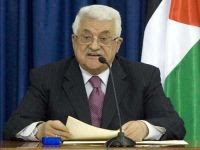Abbas praises Russia's progressive stance
Abbas: Moscow has progressive position regarding Palestine

"The destination of my first international trip was to Russia because the country has historically maintained since the time of the Soviet Union, cordial relations with Palestine and has always defended our interests," said Mahmoud Abbas, President of Palestinian National Authority, on the eve of his visit to Moscow.
Palestinian Authority president, Mahmoud Abbas, appreciated the efforts of the International Quartet for Peace in the Middle East and the prospects of Russian-Palestinian relations.
Q:
What events of recent years would you highlight as the most significant for Palestine?
Mahmoud Abbas: It is with great pleasure and satisfaction that we remember the visit of President Medvedev to Jericho, during which he visited the Russian Museum in Jericho. Since then, there have been many other events, including the major one was the visit of Vladimir Putin to Bethlehem
Nearly two months ago, the UN General Assembly adopted the resolution that gave Palestine observer state status with the organization. This was a turning point towards the establishment of an independent Palestinian state.
Q:
What, in practice, will the new status bring to Palestine, and how will it affect the situation in the Middle East?
After the adoption of the UN resolution, the whole world saw that the territories occupied by Israel in 1967 are part of the territory of a State and thus touch Agreement 4 of the Geneva Peace Conference, according to which "he who occupies a territory or a foreign state is not entitled to change its demography, nor lead population there. " This is our great victory ...
Another important point is that, from now on, we can address all official international institutions and become full members of these.
Q:
What is the main condition for the process of Israeli-Palestinian peace?
Our intent is to achieve peace based on international law, that is to say, the road map to peace and UN resolutions. The ball is in Israel's court. When the Israeli government understands that their country needs peace, as we and all other countries, we can resolve the conflict.
Q:
A wave of revolutions and regime changes happened in several Arab countries. How do these events affect the foreign policy of your country?
Our position is clear and firm: do not interfere in the internal affairs of Arab and non-Arab countries, but we are with the people of these countries and support their aspirations, especially those of the Syrian people. In Syria, there are 600 thousand Palestinians.
In the coming days, I will send a mission to Syria which will operate under the banner of non-interference in the internal affairs of the country. Our intention is to defend the Palestinians and the Palestinian refugee camps against attacks from both sides.
Q:
Their mission will only contact with the government of Assad and also with the opposition?
Our mission will go to Syria to meet with the country's leadership and dialogue with the Syrian government on the situation of Palestinian refugees in the country. Legitimate power in Syria belongs to the government of Assad, as we are guests in the country.
Q:
For several years now the International Quartet for Peace in the Middle East has addressed issues related to the pacification of the Arab-Israeli conflict. Russia is also part of this group. How do you evaluate the performance of this international body?
The quadrilateral commission created by Russia, USA, EU and UN, under UN auspices, drew up a peace plan to resolve the Middle East conflict. This plan must be put into practice by having been approved by the Security Council of the United Nations. We believe that this plan will ultimately be realized.
And I mean not only to praise the Russian side, the Russian delegation has always come to meet us, always asking our opinion on all the issues raised by the quartet.
Unfortunately, this committee has not worked for almost a year. We expect this mechanism to resume its work and fulfill its role in the pacification of the conflict.
Q:
What issues do you want addressed at a meeting with Russian President Vladimir Putin in Moscow? Which areas of Russian-Palestinian relations are developing well? Are there areas where the potential of the two sides remains underutilized?
My first international trip was to Russia because Russia has historically maintained, since the time of the Soviet Union, cordial relations with Palestine and has always defended our interests. We are always in contact with the Russian side: either visited Moscow or Russian representatives visiting Palestine.
We would like to continue exchanging views with the Russian leadership on all issues. There are no secrets between us. So let's talk frankly on the political situation in the Middle East and the general situation in the region, which has great impact on the entire Middle East.
Let's talk about the prospects of the peace process in the Middle East and the agenda of bilateral relations, of which we are proud and which we hope will continue to develop.
Translated from the Portuguese version by:
Lisa Karpova
Pravda.Ru
Subscribe to Pravda.Ru Telegram channel, Facebook, RSS!


